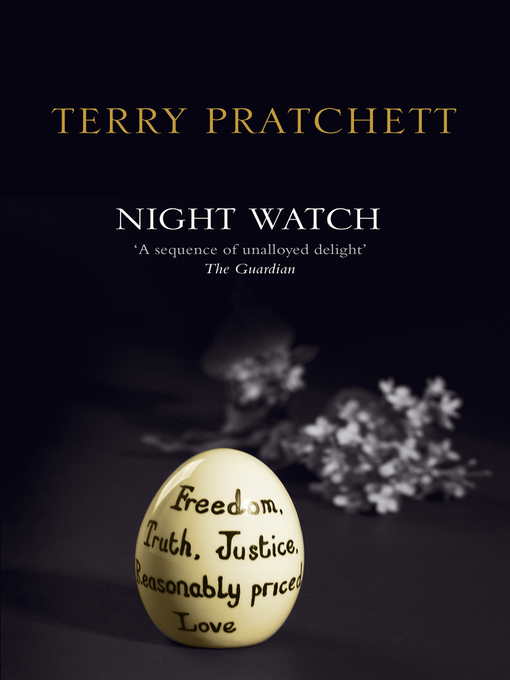Terry Pratchett's Night Watch
 I thought The Truth would remain to be my personal favorite of the Discworld series. Then Night Watch came along. I really arfing loved this one, from beginning to end. It wasn't even just about the little gems that Pratchett usually comes up with (though Death talking about cake in CAPITAL LETTERS LIKE THIS only further made me laugh and love this book even more). It was the story and the characters and well, the wibbly wobbly timey quantum-y. Yes.
I thought The Truth would remain to be my personal favorite of the Discworld series. Then Night Watch came along. I really arfing loved this one, from beginning to end. It wasn't even just about the little gems that Pratchett usually comes up with (though Death talking about cake in CAPITAL LETTERS LIKE THIS only further made me laugh and love this book even more). It was the story and the characters and well, the wibbly wobbly timey quantum-y. Yes.
Night Watch is the 29th book in Terry Pratchett's Discworld series, which is, roughly speaking, a collection of novel-length tales involving the big, highly corruptible city folk of Ankh-Morpork. Throughout the series, various events occur at different sectors of the city, from an alchemical explosion that starts off an exodus to Holy Wood, to the creation of the city's bank, newspaper, and post office. The city has wizards, vampires, golems, trolls, gargoyles, zombies, dwarfs, thieves with receipts, assassins who wear black, seamstresses who don't exactly seam (but I won't extrapolate), the worst businessman who has ever lived, an orangutan-who-was-a-wizard, and a werewolf.
But most importantly, the city has its leaders and its laws (albeit flimsy in a wibbly-wobbly way). Ankh-Morpork has its noted patrician, the highly domineering and rather stylish Havelock Vetinari. And it has the Night Watch, the policemen who patrol the streets and prevent the corruptible city from being too...lawless. You got that right.
Now, you wonder why I went into this whole explanation. It is because I believe that Night Watch encompasses all of the glories and failings of the city and its people. The story begins in the present, yet rewinds itself to the past through the failings of a number of strange, hermit-like monks with time-traveling curiosities. Trapped in their net is Sam Vimes, captain of the Night Watch, and Carcer, public enemy number one. Whisked 30 years back in time, it is up to Sam to catch the criminal before said criminal changes the future; and it is up to Sam to knock some sense into his younger self. So imagine the fun and confusion that's about to happen there.
Pratchett did not just give us a glimpse of Ankh-Morpork's now, he gave a glimpse of what it was like before the Night Watch stood for something. And he certainly showed us the beginnings of an otherwise great (and I mean this in a "I-tolerate-you-but-cross-me-and-you-die" type of way) relationship between the present captain of the Night Watch and the present patrician.
I must admit that I knew to pick the book up because of one person, and one person only: Havelock Vetinari. But Samuel Vimes was something else. If Vetinari had not been shown in his fierceness in Night Watch, I would have pegged Sam as my new favorite Morporkian. But come on, a man in black who can just waltz in and assassinate people? "Boo," I say. VETINARI DOES NOT NEED TO CREEP EITHER. He just does it out of natural ability to disappear.
Night Watch has been, so far, my favorite of the Pratchett books I've read. As usual, he had his treasure trove of lines that I lapped up and guffawed over. His plot was much deeper than I imagined, and I was practically hopping back to the beginning to figure out who lived and who died. Doing so wasn't the be-all, end-all indication, of course, but it gave me the smallest hope that certain people would at least show up again. In any case, who knew what the quantum-ness would have done with Vimes changing a bit of history?
But yes. I can really only end by refuting the following words (which I've stolen from Death, so he'll have to forgive me): "THERE IS NO MORE TIME, EVEN FOR CAKE. FOR YOU, THE CAKE IS OVER. YOU HAVE REACHED THE END OF CAKE."
On the contrary, Death. I think I'll have my cake, thanks. And this book was absolutely delicious.




